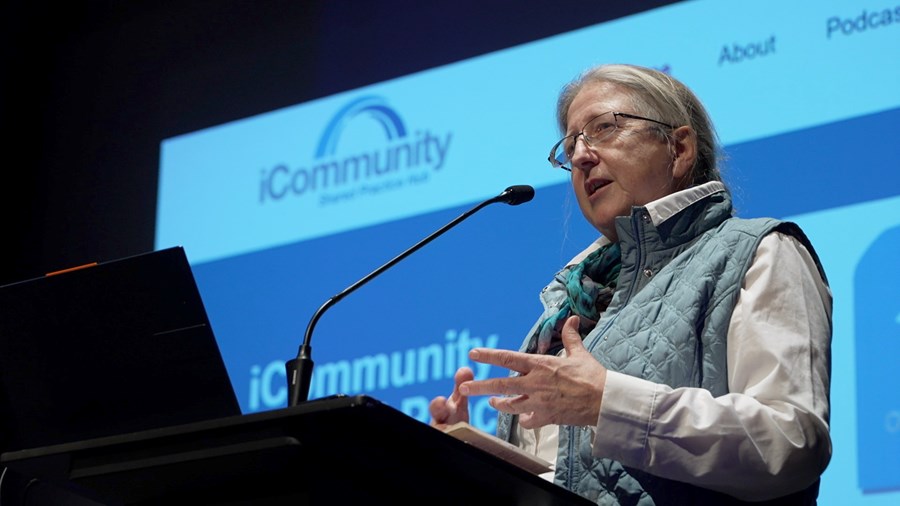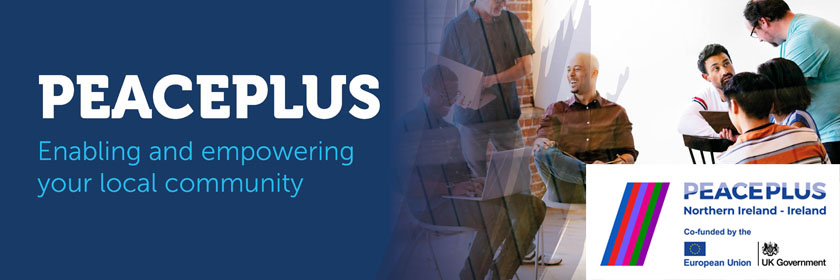The Student Accommodation Crisis in Ireland & the Potential of Community-Led Student Housing
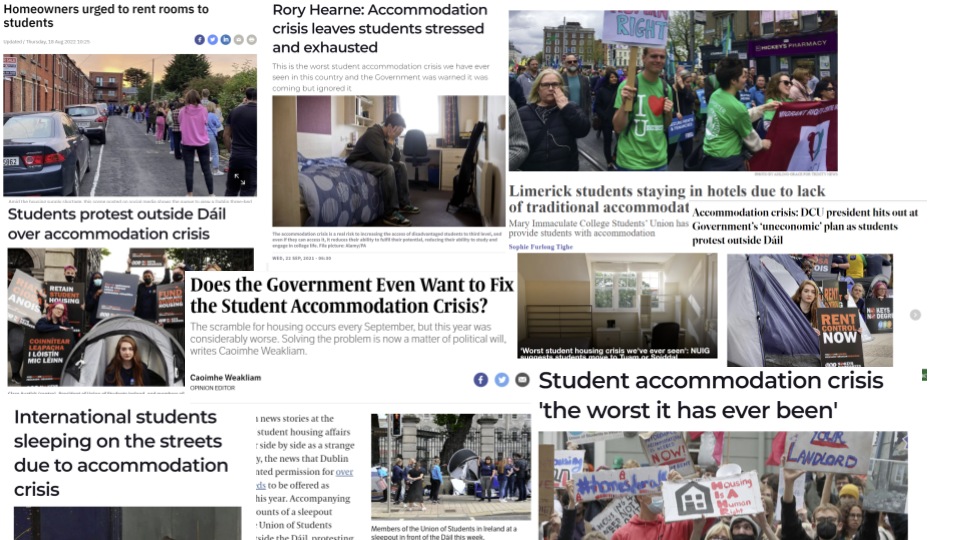
Introduction
It’s no surprise that the availability of affordable student accommodation has been on a steady decline in the past decade across Ireland, a point that has only been further highlighted in a post-pandemic world. Headline after headline has come out from reports in both independent media, such as District Magazine, and mainstream media, such as the Irish Times, decrying the ongoing exploitation of students by student accommodation suppliers, while the universities themselves are seemingly unable to keep up with construction costs, in the race to provide affordable accommodation. As students gradually get priced out of the market by private accommodation providers, they have no choice but to turn to less-than-ideal avenues of housing, from couch-surfing to digs, to often simply commuting to college from home, not being able to afford accommodation in university cities.
This is highlighted by the Union of Students in Ireland (USI) campaigning for further legislation of digs, as, while there are governmental guidelines for such situations, “the guidelines are not enough”, as USI President Chris Clifford put it. Interestingly, the National Student Accommodation Survey conducted in 2022 in the UK revealed that Northern Ireland has an average monthly rent of £396, the lowest in the UK, and far below the some €1000 students have to pay monthly in private accommodation in the Republic. This disparity may drive students in the republic to consider studying in the North to simply save on rent, highlighting potential shortcomings in the Irish government’s approach to housing and education.
Dereliction
A sometimes ignored factor of the student accommodation crisis, is the role dereliction plays on limiting the availability of accommodation. The work done by Frank O’Connor and Jude Sherry of the Anois Agency has highlighted the sheer number of derelict properties in Irish cities like Cork, often owned by public institutions, such as universities and councils, which are lying vacant, disused and decaying. One doesn’t have to go far to see a similar story in every town, city and village in Ireland, with many properties having fallen into disuse over the course of decades, not just years. This is in stark contrast with the narrative propagated by far-right protestors asserting that Ireland is “full.”
While some progress has been made in the form of the Irish government announcing funding in the recent budget to bring derelict properties back into public supply, there is still much to be done. Compounding the issue is the fact that 1 in 6 TDs in the current Dáil are landlords, creating potential conflicts of interest that impedes the formulation of forward-looking housing policies that do not further entrench the status quo.

Cost of Living
Underlying the student accommodation crisis reveals the broader housing crisis in the Republic of Ireland (ROI). This housing challenge is, in turn, a component of the overarching Cost of Living Crisis currently impacting students in both the Republic and Northern Ireland. This crisis has impacted everything from food, to rent, to basic services like healthcare.
A strong movement calling for policy change has arisen in response to these challenges, bringing together a coalition that includes trade unions, student unions, opposition parties, and diverse pro-social advocacy groups. There have been widespread protests increasing year on year, with the most recent being in October 2023, in the lead-up to the ROI 2024 Budget release. This budget was criticised by the Union of Students in Ireland (USI) as focusing on short-term, one-off measures that do nothing to change the status quo. It’s clear that something has to change if students, and everyone affected by this crisis are to live their lives without fear of poverty. The solidarity economy of co-operation is one way to address this challenge.
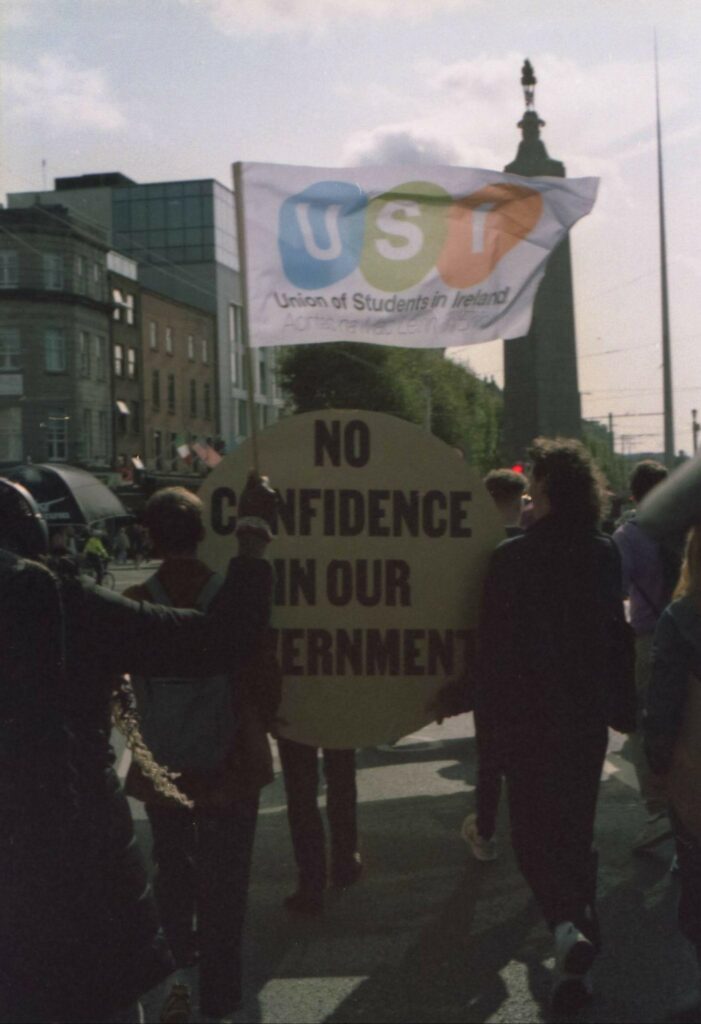
What is the Solidarity Economy?
According to the United Nations definition, the Social and Solidarity Economy encompasses economic activities which prioritise social and environmental objectives over profit motives; through the collective action of citizens working in solidarity with one another. Organisations within the solidarity economy are built upon “democratic governance and self-management, reciprocity, solidarity, and active citizenship”, and develop at the grassroots level. These social organisations play a pivotal role in offering social services to communities in circumstances where government, public agencies and the market have left significant gaps.

Examples of Social and Solidarity Economy Organisations:
- Co-operatives and other mutual associations.
- Self-help groups.
- Community environmental groups.
- Credit Unions.
- Non-profit organisations and social enterprises.
- Employee-owned enterprises.
- Online crowdfunding.
- Open-source software.
- Sport and cultural associations.
- Community-led housing associations.
There are many wonderful examples of communities taking collective action to solve local issues. Citizens collectively organise and work in solidarity with one another to solve mutual local needs in both jurisdictions on the island of Ireland and in countries around the globe. This is increasingly being recognised as evidenced by the OECD Council at Ministerial level endorsing the Recommendation on Social and Solidarity Economy and Social Innovation on the 10th June 2022, based on the proposal from the Local Employment and Economic Development Committee (LEED).

This recommendation emphasises the potential of the social economy to pioneer innovative business models, deliver vital services, contribute to a more equitable, sustainable, and digital transition, involve young people, and foster community building. It acknowledges the diverse practices within the social economy and underscores the necessity for policy tools that can be applied across various country contexts and different stages of social economy development.

What is Community-led housing?
Community-led Housing is a bottom-up approach that allows people to “pool their collective resources to create homes that are accessible and affordable to all”. Types of community-led housing include:
- Co-operative housing
- Cohousing
- Community Land Trusts (CLTs)
- Self-help housing.
Community-led housing comes in all different forms, but they all share the common goal of “meeting specific local housing needs via collaboration, empowerment and mutual support”. They involve local stakeholders to envision and develop a more sustainable housing option for their local area.
Some examples of European Student Housing Co-operatives include:
- The Edinburgh Student Housing Co-operative (ESHC)

Image: Communal Area at the ESHC
Probably one of the biggest success stories of student housing co-operatives in the UK, the Edinburgh Student Housing Co-operative is managed collectively by their 100 student members who live within the co-operative. Through the help of a local housing association, the ESHC were able to purchase an old student accommodation property and through the collective action of its student members, have renovated the building into a beautiful, artistic and community-minded home for over 100 students. The ESHC have managed to meet their original goal of providing low cost student accommodation, with one of the cheapest student accommodation rents in the city of Edinburgh. While the cost of living crisis is putting a strain on their activities, they continue to provide affordable accommodation to their members through ongoing fundraising activities. - La Ciguë in Geneva, Switzerland
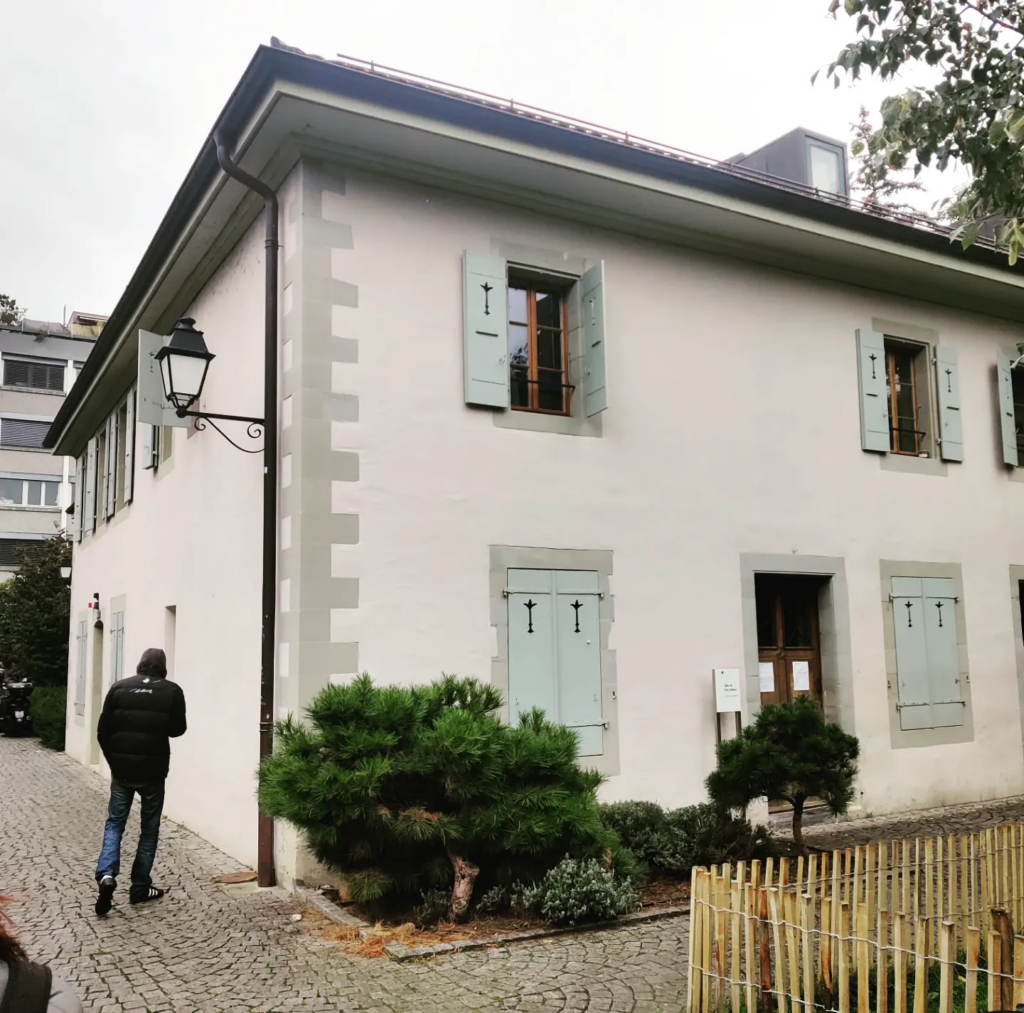
Image: Clos Voltaire Student Housing Co-op
La Ciguë is a co-operative which manages over 10 student and young-adult housing co-operatives across the city of Geneva. One housing co-operative, Hex.ao, was formed through the cooperation with the local city council who granted La Ciguë access to live and work in a derelict factory that was set for demolition in a number of years. Rather than laying dormant until demolition, it became home to 6 young adults who now live and work in the space. Another one of their cooperatives, Clos Voltaire, brought a beautiful old historical building (the old summer house of writer Voltaire!) back to life to provide accommodation to over 30 students. This transformation has aided in the local regeneration of a once worn-down part of the city, benefiting both the students and the local area.
Image: Bedroom at Clos Voltaire Student Housing Co-op
The Vision of the Cork Student Housing Co-operative

For the students in Cork City, affordable accommodation is incredibly hard to come by. Rents are rising year on year, coupled with the entry of multiple luxury student accommodation providers across the city, many students are being priced out of the market. Students are becoming increasingly stressed when it comes to finding suitable accommodation, with some students unable to find accommodation they can afford, jeopardising their ability to access third level education. After learning about co-operative housing through the UCC Centre for Co-operative Studies, a small band of UCC students have come together to form the Cork Student Housing Co-operative (CSHC).
Our aim is to set up the first student housing co-operative in the Republic of Ireland. The vision is to make affordable, inclusive co-operative housing a viable option for students when looking for accommodation in Cork City.
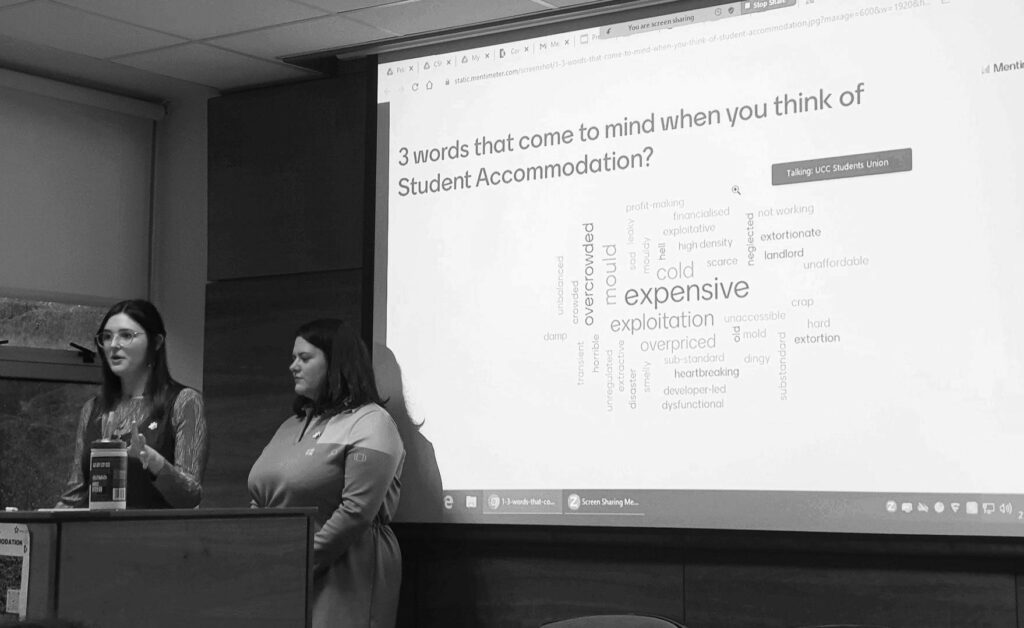
The CSHC hopes to empower students to combat the student accommodation crisis in Cork city through collective action. We are open to working with the local council and other organisations who have properties laying dormant across the city to pilot their community-led housing project. Our aim is to create a number of student housing co-operatives across the city of Cork that address a range of student needs, such as being low-cost, having disability access, being safe spaces and having a homely, community feel. The members of the CSHC have dreams to bring derelict properties back to life to create comfortable, sustainable homes for students through the power of collective action, building a sense of pride and ownership in their homes and local community.
The power of bottom-up action cannot be dismissed, especially when it comes to solving difficult issues such as the student accommodation crisis. Collective action can enact widespread sustainable change and challenge societal norms for the better.
Working cooperatively with one another can help us in the just transition to a fairer, more ethical and sustainable world. Embracing our indigenous roots of ‘meitheal’ (the act of communities working together to meet local needs) can help to see us through some of society’s greatest challenges.

Learn More:
Keep up to date with the students of the Cork Student Housing Co-operative here: https://linktr.ee/corkstudenthousingcooperative
Online Zine – The Vision of the Cork Student Housing Co-operative: https://issuu.com/corkstudenthousingcooperative/docs/cshc_e-zine
Community-Led Housing in Ireland: https://soa.ie/

